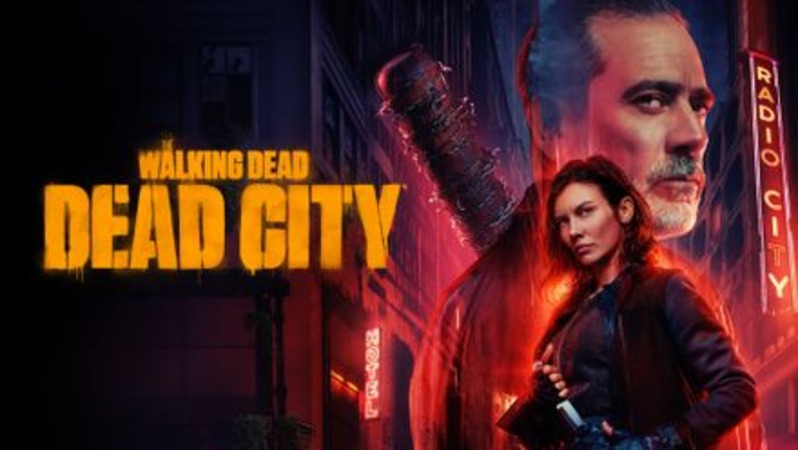“If history were a conflagration,” then The Walking Dead: Dead City’s finale is where the flames finally lick the fault lines of identity, not to reveal redemption, but repetition. Though the forager parable and voiceovers gesture toward possibility—Maggie (Lauren Cohan), Armstrong (Gaius Charles), and Negan (Jeffrey Dean Morgan) poised at some mythic fork in the road—it’s the Dama’s caustic insight that gives the game away. Maggie isn’t stepping forward. She’s stuck in a loop. And the show, despite its best Jedi mind tricks, knows it too.
 |
| “If History Were a Conflagration” – THE WALKING DEAD: DEAD CITY, Pictured: Lauren Cohan as Maggie Rhee, Lisa Emery as The Dama. Photo: Robert Clark/AMC© 2025 AMC Networks Inc. All Rights Reserved. |
Across The Walking Dead and Dead City, Maggie and Negan have shared a volatile rhythm: moments of uneasy alliance shadowed by unresolved grief. Maggie never truly forgave Negan for killing Glenn—she tolerated him when survival demanded it. But that tolerance was a performance. Beneath it, her anger remained incandescent. So, if history were a conflagration—not just fire, but uncontained destruction, a blazing inheritance of unresolved harm—then Maggie is history.
 |
| “If History Were a Conflagration” – THE WALKING DEAD: DEAD CITY, Pictured: Jeffrey Dean Morgan as Negan. Photo: Robert Clark/AMC © 2025 AMC Networks Inc. All Rights Reserved. |
So, when she stabs him—literally—it’s not personal vengeance. It’s an indictment of what their entire relationship has been: a cold alliance built on utility, not healing. Unfortunately, the act bypasses dialogue and sidesteps meaningful resolution. It declares even in cooperation, ‘I never trusted you.’ And that’s the heartbreak. Every moment of Maggie and Negan’s shared survival wasn’t reconciliation, but a brittle détente.
 |
| “If History Were a Conflagration” – THE WALKING DEAD: DEAD CITY, Pictured: Kim Coates as The Bruegel. Photo: Robert Clark/AMC© 2025 AMC Networks Inc. All Rights Reserved. |
Early on, Bruegel’s (Kim Coates) monologue about weapons as the eternal currency of power positions this world as one that refuses change. His glee isn’t just sadistic—it’s prophetic. The Dama and the Burazi, New Babylon, and Bruegel’s gang do not innovate. They kill to reclaim the past and preserve its ashes. Civilization, here, is a closed circuit of violence dressed up in ritual.
Trauma is caught in that circuit, too.
He hasn’t been taught the language of love. He speaks bitterness instead. For example, he could’ve punched Maggie and it would’ve hurt less than when he spat: “You’ve got it all figured out because you did it so F**ing perfectly for yourself.”
 |
| “If History Were a Conflagration” – THE WALKING DEAD: DEAD CITY, Pictured: Logan Kim as Hershel. Photo: Robert Clark/AMC© 2025 AMC Networks Inc. All Rights Reserved. |
One of the episode’s most stirring moments happens before the opening credits, before a single word is spoken. A drone glides silently over a decaying skyline. Then, in stillness, the camera rests on each of the main cast’s faces. Things are still and reverent. More than atmosphere, it signals we’re witnessing stasis, not action. Not crossroads, but cycles. This is trauma calcified into architecture: isolation as inheritance. Movement arrested.
 |
| “If History Were a Conflagration” – THE WALKING DEAD: DEAD CITY, Pictured: Gaius Charles as Armstrong. Photo: Robert Clark/AMC © 2025 AMC Networks Inc. All Rights Reserved. |
Because Season 2 doesn’t resolve, it unsettles. It peels back the noise to reveal the deeper question beneath all this death and mythmaking: Can a future be born if no one remembers how to speak it?

